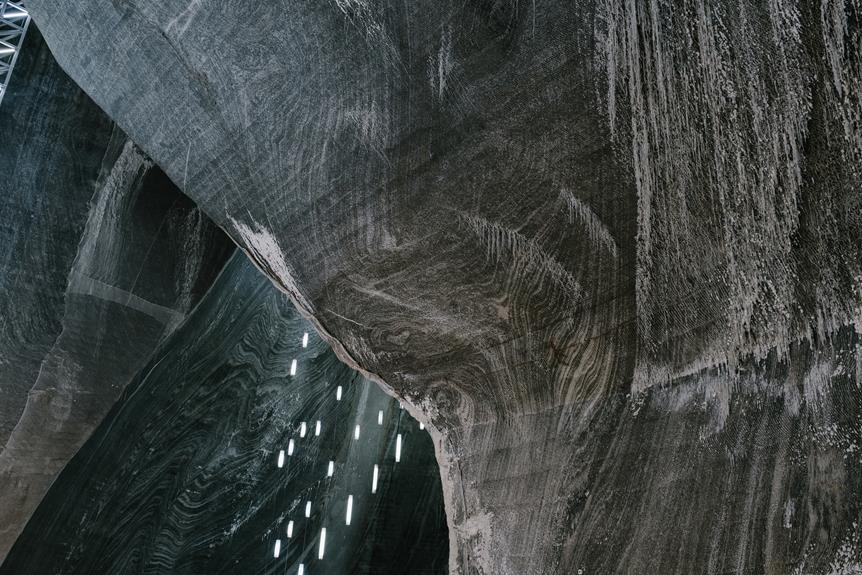Are you aware that over 14 million tons of rock salt is used annually by the United States alone?
Rock salt is extremely versatile, but it can also have some side effects. In this article, we'll explore the skin irritation, respiratory issues, and health hazards of rock salt, as well as how to avoid them and alternative uses for rock salt.
Let's get started!
Skin Irritation From Rock Salt
You may experience skin irritation from rock salt if it comes into contact with your skin. It can cause a burning sensation, and sometimes result in an allergic reaction.
It's important to protect your skin when handling rock salt and wear gloves where possible. Avoid contact with any open wounds, and wash your skin with water and soap after handling rock salt.
If you have any concerns or experience severe skin irritation, seek medical advice immediately.
Respiratory Issues Caused by Rock Salt
Breathing in rock salt can cause respiratory issues such as coughing and difficulty breathing. Burning sensation and throat discomfort can be felt, as the salt irritates the airways and lungs. Inhaling the particles can cause inflammation and chest tightness. At times, this can lead to asthma attacks and other respiratory infections.
It's best to keep away from rock salt if you have any existing respiratory issues or are sensitive to it. Taking preventive measures and avoiding exposure can help reduce the risk of respiratory problems.
Health Hazards of Rock Salt
Other than respiratory issues, there are other potential health hazards associated with rock salt that you should be aware of:
- Ingestion:
- Rock salt can be toxic to humans if ingested in large quantities.
- Overconsumption can lead to dehydration, electrolyte imbalance, and other potentially serious medical issues.
Environmental Impact:
- Rock salt can contaminate soil and water, negatively affecting wildlife and ecosystems.
- Overuse of rock salt can also damage concrete, metal, and other materials.
Skin Irritation:
- Prolonged contact with rock salt can cause skin irritation and rashes.
- Inhalation of rock salt can also cause coughing and respiratory distress.
Ways to Avoid Rock Salt Side Effects
If you're worried about the side effects of rock salt, there are steps you can take to avoid them.
Wear gloves when handling the salt, cover your face with a mask, and never ingest it.
Be mindful of your surroundings when using rock salt. If you feel any irritation or pain, take a break and seek medical attention if needed.
Taking these precautions will ensure you have a safe and healthy experience when using rock salt.
Alternative Uses for Rock Salt
You can use rock salt for a variety of tasks, such as de-icing driveways or seasoning your cooking. It can also be used in a creative way:
For Cooking:
- Make flavored salts
- Add to rubs
- As a garnish
For Gardening:
- Fertilizing
- Enhancing compost
- Controlling weeds
For Cleaning:
- Unclogging drains
- Removing stains
- Freshening rugs.
Rock salt is a versatile, natural resource with many potential uses. Try it out for a creative, liberating experience!
Frequently Asked Questions
What Is the Difference Between Rock Salt and Regular Table Salt?
Rock salt and regular table salt both contain sodium chloride, but there are health risks associated with rock salt. It can cause skin irritation, and its coarser texture may be hard on the digestive system. Table salt is a safer choice for daily consumption.
Is Rock Salt Safe for Pets to Ingest?
It's important to consider the risks of pet ingestion when using rock salt. Alternatives like magnesium chloride are safer. Be mindful of your pet's health and seek guidance from a veterinarian.
Is Rock Salt Safe to Use on Food?
Investigate the chemical composition of rock salt to understand its safety for use on food. It's generally low in health risks, but use in moderation to avoid any unwanted effects. Empower yourself with knowledge to make informed decisions for your health.
Is Rock Salt Safe to Use on Driveways and Walkways?
Yes, rock salt is safe to use on driveways and walkways, but be aware of over application as it can lead to durability issues. Use it sparingly to ensure long lasting pathways.
Are There Any Environmental Effects of Using Rock Salt?
You care about the environment, so you may be surprised to learn that rock salt can have a serious pollution impact and cause ecosystem damage. But with the right knowledge, you can liberate yourself from the worry and make informed decisions.
Conclusion
You may be surprised to learn that rock salt can cause a variety of side effects. From skin irritation to respiratory issues, there are a number of health hazards associated with the use of rock salt.
Fortunately, there are ways to avoid these side effects, such as using protective clothing and gloves. Plus, rock salt has some surprisingly interesting alternative uses, such as making homemade ice cream and natural cleaning products.
It's estimated that 80% of households in the United States use rock salt in some form or another. So, remember to take the necessary precautions when using rock salt to ensure your safety and wellbeing.






